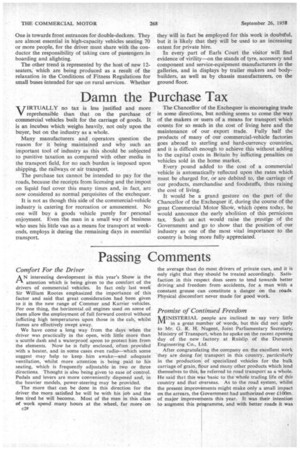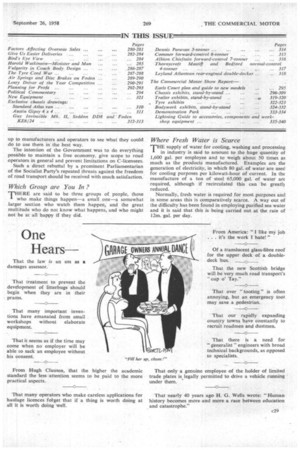Passing Comments
Page 94

Page 95

If you've noticed an error in this article please click here to report it so we can fix it.
Comfort For the Driver
A N interesting development in this year's Show is the attention which is being given to the comfort of the drivers of commercial vehicles. In fact only last week Sir William Rootes emphasized the importance of this factor and said that great consideration had been given to it in the new range of Commer and Karrier vehicles. For one thing, the horizontal oil engines used on some of them allow the employment of full forward control without inflicting high temperatures upon those in the cab, whilst fumes are effectively swept away.
We have come a long way from the days when the driver was practically in the open, with little more than a. scuttle dash and a waterproof apron to protect him from the elements. Now he is fully enclosed, often provided with a heater, and in some cases even radio—which some suggest may help to keep him awake—and adequate ventilation, whilst more attention is being paid to his seating, which is frequently adjustable in two or three directions. Thought is also being given to ease of control. Pedals and levers are more conveniently disposed and, in the heavier models, power-steering may be provided.
The more that can be done in this direction for the driver the more satisfied he will be with his job and the less tired he will become. Most of the men in this class of work spend many hours at the wheel, far more on
c28
the average than do most drivers of private cars, and it is only right that they should be treated accordingly. Satisfaction in this respect does seem to tend towards better driving and freedom from accidents, for a man with a constant grouse can constitute a danger on the roads.. Physical discomfort never made for good work.
Promise of Continued Freedom
MINISTERIAL people are inclined to say very little in a great number of words, but this did not apply to Mr. G. R. H. Nugent, Joint Parliamentary Secretary, Ministry of Transport, when he spoke on the recent opening day of the new factory at Ruislip of the Duramin Engineering Co., Ltd.
After congratulating the company on the excellent work they are doing for transport in this country, particularly in the production of specialized vehicles for the bulk carriage of grain, fl ur and many other products which lend ;
themselves to this,e referred to road transport as a whole. He said that this w s basic to the whole trading life of this country and that verseas. As to the road system, whilst the present improv ments might make only a small impact on the arrears, the tiovernment had authorized over £100m. of major improvenients this year. It was their intention to augment this prOgramme, and with better roads it was
up to manufacturers and operators to see what they could do to use them in the best way.
The intention of the Government was to do everything possible to maintain a free economy, give scope to road operators in general and prevent limitations on C-licensees.
Such a direct rebuttal by a prominent Parliamentarian of the Socialist Party's repeated threats against the freedom of road transport should be received with much satisfaction.
Which Group are You In?
'f THERE are said to be three groups of people, those HERE make things happen—a small one—a somewhat larger section who watch them happen, and the great multitude who do not know what happens, and who might not be at all happy if they did.
Where Fresh Water is Scarce
THE supply of water for cooling, washing and processing in industry is said to amount to the huge quantity of 1,600 gal. per employee and to weigh about 50 times as much as the products manufactured. Examples are the generation of electricity, in which 80 gal. of water are used for cooling purposes per kilowatt-hour of current. In the manufacture of a ton of steel 65,000 gal. of water are required, although if recirculated this can be greatly reduced.
Normally, fresh water is required for most purposes and in some areas this is comparatively scarce. A way out of the difficulty has been found in employing purified sea water and it is said that this is being carried out at the rate of 12m. gal. per day.












































































































































































































































































































































